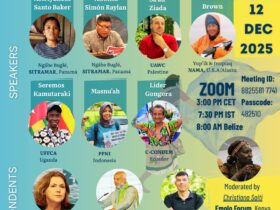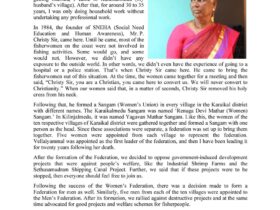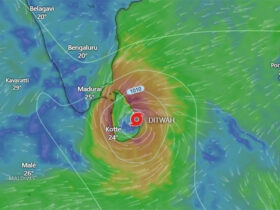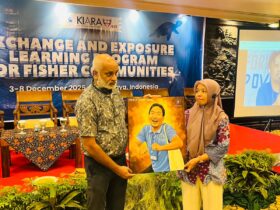Declaration made by: participants of the Masifundise Marine Protected Area Workshop, Langebaan, April 14-th 16th April, 2010
We, representatives from small-scale fishing communities, Masifundise and other organisations working with and in support of fishers in South Africa, having participated in the workshop “Protecting Community Rights in Marine Protected Areas” in Langebaan, 14th -16th April, 2010.
We are committed to contributing towards sustainable marine biodiversity and sustainable, equitable coastal livelihoods in South Africa.
We are very aware that our coasts are very important, ecologically rich and diverse marine environments, of critical importance for the biological diversity of the country as a whole for current and future generations as well as being a source of important economic, social and cultural resources.
We see MPAs as one of several important tools in order to protect our marine environments in the future. We believe that MPAs are very important but they need to be planned and managed in such a way that they balance the needs to protect the marine environment whilst promoting poverty alleviation, integrated livelihoods and a human rights approach to development along the coast.
Our vision is of an equitable, sustainable and biologically rich and diverse marine environment that promotes small-scale fisheries, working towards poverty alleviation and sustainable local economic development.
We note that our small-scale fishing communities up and down the coast have lengthy histories of using and managing our marine resources as the basis for our life and livelihoods. We have developed extensive indigenous and locally based knowledge of the marine environment and many of our customary, social and cultural practices are closely linked to our coastal livelihoods and use of marine resources. Our traditional fisheries thus have important cultural heritage value and are an integral part of the marine biodiversity systems in our coast.
We also note that in the past many MPAs have been imposed on local communities, dispossessing them of their access to resources, their local social and cultural rights and opportunities and this has created a negative perception of MPAs amongst many fishing communities. The ways in which MPAs are currently being managed has meant that local communities have not benefited equitably. In some instances MPAs have negatively impacted local communities’ livelihoods
We are concerned that unsustainable fishing practices, especially those of the industrial and recreational sectors, coupled with land and sea based pollution, unrestricted tourism developments along the coast as well as the influence of climate change, are impacting the sustainability of our marine environments. We believe that this requires an integrated approach to marine and coastal management, using a range of management tools. We note the international and regional biological diversity commitments to which South Africa has committed itself, most notably the Convention on Biodiversity (CBD), as well as a range of international fisheries management laws and policies, such as the Code of Conduct for Responsible Fisheries.
We urge our government to ensure that the new MPA policy and the new SFF will work towards realising the principles embodied in these international instruments as well towards the principles contained in our Constitution and National Environmental Legislation.
We call for human rights based, environmentally sustainable and integrated approach to MPAs based on the following:
• Recognising the rights of bone fide small-scale fishing communities living in or adjacent to marine protected areas and granting them preferential access to marine resources in these areas;
• Recognising the right to participation and the full involvement of fishing communities in all stages of planning and decision-making in all MPAs , recognising their role and valuing their indigenous knowledge in the research involved in the planning process
• Recognise the importance of gathering information on the potential social, cultural and economic impacts on the local communities living in and adjacent to the area
• Affirming the principle of co-management and decentralisation of decision-making, establish the necessary and appropriate institutional arrangements such as forums at local, regional and national level that will work towards progressively achieving a partnership between government, communities and other stakeholders, including for each MPA The development of MPA policy and planning must include representatives from fishing communities
• Involve local government municipalities and local and provincial forums and ensure integration of these structures with MPA planning and management at this level where appropriate.
• Ensure that governance and decision-making in MPAs is transparent and accountable
• Ensure that co-management committees and local forums are given the necessary power that they require in order to manage local resources effectively
• Ensure that the planning of off-shore MPAs is done in an integrated way and is linked to the planning and management of in-shore
• Ensure that local communities benefit equitably from MPAs, particularly from the introduction of non-consumptive use related livelihood opportunities
• Involve communities in local monitoring of fishing and other activities in MPAs, drawing on the local knowledge of these communities
• The design and planning of MPAs must take into consideration the specific needs of each area and design specific management plans for each area.
• Design MPAs using zonation flexibly to maximise protection and benefits for both the marine ecosystem and local small-scale fishing communities whilst creating opportunities for a wide range of users to enjoy the benefits of the marine environment
• Restricting the use of all destructive practices such as industrial trawling, mining and weapons testing within MPAs
• Build the capacity of local communities and leadership to establish democratic process and representative structures at local level, conduct training and raise their awareness about the objectives of MPAs
• o train young people from local communities and create opportunities for them to share their indigenous knowledge with visitors to MPAs
• Take specific steps and establish particular mechanisms to provide opportunities for women and youth to be involved and benefit from MPAs through education and alternative livelihood opportunities
• Take specific steps to create opportunities to educate children and to create bursary or funding opportunities for them to become involved in protected area management
• Provide financial support and subsidies to small-scale communities to develop their fisheries sustainably and appropriately
• Promote the exchange of skills and lessons across MPAs and communities living in or adjacent to MPAs
• Ensure the free flow and availability of information to local fishing communities
• Commit to the use of local labour in all projects to ensure equitable benefits for local fishing communities
• Commit to co-operative governance and intra-government co-operation across all three tiers of government and between all departments while effectively working towards an integrated and, sustainable approach to marine conservation and fisheries management. Ensure effective compliance and enforcements in each MPA to ensure that illegal harvesting is eliminated
• Build in systems that ensure there is regular feedback and reviews of the MPA and its impact on the local community and marine ecosystem
• Ensure that government allocates sufficient human and other resources to manage this effectively.





Leave a Reply